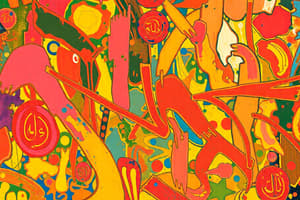Podcast
Questions and Answers
What do Shi'ites believe regarding the ruler of the Islamic people?
What do Shi'ites believe regarding the ruler of the Islamic people?
- Chosen by the people
- Direct descendent of Muhammad (correct)
- Selected by consensus
- None of the above
What do Sunnis believe regarding the ruler of the Islamic people?
What do Sunnis believe regarding the ruler of the Islamic people?
- Should be a scholar
- From a noble family
- Direct descendent of Muhammad
- Chosen by the people (correct)
What was the capital of the Sasanid Empire?
What was the capital of the Sasanid Empire?
Ctesiphon
Mecca is a religious center of Islam where Muslims face when they pray.
Mecca is a religious center of Islam where Muslims face when they pray.
Who is the prophet of Islam?
Who is the prophet of Islam?
What is the Quran?
What is the Quran?
What is the Umayyad Caliphate known for?
What is the Umayyad Caliphate known for?
The Abbasid Caliphate overthrew the Umayyad Caliphate.
The Abbasid Caliphate overthrew the Umayyad Caliphate.
What does the term 'umma' refer to in Islam?
What does the term 'umma' refer to in Islam?
What is the central administration of the Roman Catholic Church called?
What is the central administration of the Roman Catholic Church called?
What is the definition of feudalism?
What is the definition of feudalism?
What is the Holy Roman Empire?
What is the Holy Roman Empire?
What was the capital of the Aztec Empire?
What was the capital of the Aztec Empire?
What happens in a tribute system?
What happens in a tribute system?
Who was Genghis Khan?
Who was Genghis Khan?
The Yuan Empire was created by Khubilai Khan.
The Yuan Empire was created by Khubilai Khan.
What was the Ming Empire known for?
What was the Ming Empire known for?
What does the term 'shogunate' refer to in Japan?
What does the term 'shogunate' refer to in Japan?
What does Zen refer to in Buddhism?
What does Zen refer to in Buddhism?
Flashcards are hidden until you start studying
Study Notes
Islamic Sects and Key Figures
- Shi'ites: Believe rulers should be descendants of Muhammad; represents one branch of Islam.
- Sunnis: Oppose Shi'ite views, advocating for leaders chosen by communities regardless of lineage.
- Muhammad: Prophet of Islam, born in 570; received divine revelations forming the Quran.
- Muslim: An adherent of Islam who submits to Allah's will.
- Caliphate: Office succeeding Muhammad's leadership to govern the Islamic community, also refers to the empire.
Islamic Empires and Cultural Centers
- Sasanid Empire: Established in 224 AD, centered in Ctesiphon, Mesopotamia; overthrown by Islamic armies in 651.
- Umayyad Caliphate: First hereditary dynasty, ruled an empire from Spain to India with Damascus as its capital.
- Abbasid Caliphate: Overthrew Umayyads; ruled from Baghdad from 750 to 1258, known for cultural and scientific advances.
Key Places in Early Islamic History
- Mecca: Sacred religious center for Muslims; direction of prayer.
- Medina: City to which Muhammad emigrated in 622 to escape persecution in Mecca.
- Quran: Sacred text of Islam, compiled from revelations to Muhammad between 610 and 632.
European and Asian Historical Developments
- Charlemagne: King of the Franks (742-814) who expanded the Carolingian Empire and initiated an intellectual revival despite personal illiteracy.
- Byzantine Empire: Eastern portion of the Roman Empire; significant from the fourth century onward.
- Feudalism: Societal structure in medieval Europe based on land, protection, and vassalage.
Cultural and Technological Innovations
- Movable type: Printing technology allowing individual characters; significant advancement from woodblock printing.
- Gunpowder: Explosive substance developed in China; pivotal in military applications.
Asian Dynasties and Philosophies
- Tang Empire: United China and Central Asia (618-907), known for its cultural and political achievements.
- Song Empire: Advanced in technology and commerce; distinguished between northern Liao and southern Jin control.
- Zen: A form of Mahayana Buddhism in Japan, emphasizing meditation.
- Neo-Confucianism: A revival and reinterpretation of Confucian thought prevalent in China from the Song era onwards.
Mesoamerican Civilizations
- Maya: Known for advancements in mathematics and astronomy; influential civilization concentrated in Mexico's Yucatán Peninsula and Central America.
- Aztecs: Established a powerful empire (1325-1521) in central Mexico; relied on a tribute system to maintain their power.
- Tenochtitlan: Capital located on Lake Texcoco; a major urban center for the Aztecs with a population around 125,000 pre-conquest.
Andean Civilizations
- Inca: Largest empire in the Andes, controlled the coastal region from Ecuador to Chile with its capital in Cuzco.
- Mit'a: Labor system shared among Andean peoples, requiring work for the ruler and religious obligations.
- Moche: Influential Andean civilization known for urban centers and irrigation systems.
Mongol Empire and Its Legacy
- Genghis Khan: Founder of the Mongol Empire; his conquests linked Eastern and Western Eurasia.
- Yuan Empire: Established by Khubilai Khan; controlled parts of China and Siberia from 1271 to 1368.
- Timur (Tamerlane): Conqueror who established the Timurids and promoted Sunni Islam's orthodox status.
Important Terms and Concepts
- Pilgrimage: Religious journeys undertaken by believers to sacred sites; significant in both Islam (Mecca) and Christianity.
- Tribute system: Mechanism utilized by empires for collecting goods and labor from defeated peoples, supporting large cities and their economies.
- Schism: Formal religious split, significant in various faiths including Christianity and Islam.
Notable Cultural Practices
- Footbinding: Chinese custom for enhancing beauty; popular during the Song Empire.
- Bloodletting rituals: Ceremonial practices in Mesoamerica, indicative of religious beliefs and societal roles.
Exploratory Ventures
- Zheng He: Notable explorer during the Ming Dynasty who led extensive maritime expeditions in the Indian Ocean.
Studying That Suits You
Use AI to generate personalized quizzes and flashcards to suit your learning preferences.




